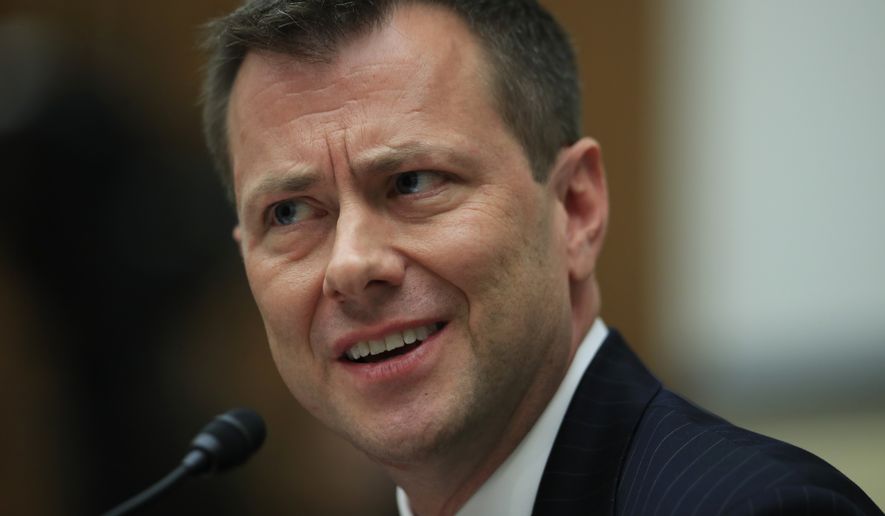FBI agent Peter Strzok became a face of anti-Trump resistance within the government. It’s now cost him his job.
Mr. Strzok confirmed Monday that he had been fired from the FBI, months after an internal watchdog revealed damning text messages he exchanged with paramour and fellow FBI employee Lisa Page vowing to “stop” Donald Trump’s rise to the White House.
Liberal activists decried his firing, while Republicans — including Mr. Trump — said it was part of an overdue housecleaning at the FBI.
“Finally,” the president said on Twitter. “The list of bad players in the FBI & DOJ gets longer & longer.”
Both the FBI and the Justice Department declined to comment on the firing, which was first reported by The Washington Post.
Mr. Strzok took to Twitter to defend himself, saying he was “deeply saddened by this decision.”
SEE ALSO: Peter Strzok became the face of Mueller’s Trump-Russia probe
He posted a statement from his attorneys saying that the FBI’s office of professional responsibility had recommended a 60-day suspension and demotion, but Deputy Director David Bowdich overruled that recommendation and ordered the firing.
“This decision should be deeply troubling to all Americans. A lengthy investigation and multiple rounds of congressional testimony failed to produce a shred of evidence that Special Agent Strzok’s personal views ever affected his work,” the attorneys said.
Mr. Strzok, a veteran of 21 years at the FBI, found himself at the spear’s tip of political investigations over the past few years. He first played an instrumental role in the inquiry into Hillary Clinton’s emails and then led the FBI’s investigation into Mr. Trump and Russian meddling in the 2016 election.
When the Justice Department created a special counsel to pick up the investigation, Mr. Strzok was part of that effort, too.
That role came to an end after the Justice Department’s inspector general revealed thousands of email messages exchanged between Mr. Strzok and Ms. Page showing a pattern of animosity toward the president.
During the 2016 campaign, he talked of an “insurance policy” in case Mr. Trump became president. When Ms. Page fretted in August 2016 that Mr. Trump might go on to win the White House, Mr. Strzok replied: “No. No he’s not. We’ll stop it.”
Ms. Page, who was also briefly a part of the special counsel team, left the FBI earlier this year. She is said to have left voluntarily to pursue a job elsewhere.
Mr. Trump has repeatedly chided the FBI for employing Mr. Strzok and Ms. Page. On Monday, he said Mr. Strzok’s firing should discredit the ongoing special counsel’s work and that it undercuts the FBI’s investigation into Mrs. Clinton. The bureau cleared Mrs. Clinton of criminal wrongdoing even though it called her handling of top-secret information reckless.
“Just fired Agent Strzok, formerly of the FBI, was in charge of the Crooked Hillary Clinton sham investigation. It was a total fraud on the American public and should be properly redone!” Mr. Trump said.
Called to testify to the House last month, Mr. Strzok insisted he wasn’t part of the Trump resistance and said “not once” did his personal views interfere with his job decisions.
The inspector general reviewed the handling of the Clinton investigation and concluded in June that political bias didn’t play a role there. But he said he couldn’t rule out that Mr. Strzok’s bias played a role in decisions regarding the Russia investigation during the 2016 campaign. That review is continuing.
Trump supporters say Mr. Strzok took number of questionable steps to ensnare the Trump campaign in a long investigation:
⦁ He opened the Trump investigation on July 31, 2016, based on hearsay from an Australian diplomat via the U.S. Embassy in London. The diplomat said a Trump volunteer, George Papadopoulos, told him that a Russian-connected professor heard that Moscow owned thousands of Mrs. Clinton’s emails. Conservatives call this nothing more than political gossip about the 30,000 emails she had destroyed.
⦁ Mr. Strzok’s FBI team embraced an unverified dossier written by former British spy Christopher Steele, who was paid by Fusion GPS with money from the Clinton campaign and Democratic Party. The FBI used the dossier to persuade a court to approve a wiretap on Trump campaign volunteer Carter Page. The bureau also relied on the dossier to guide the investigation. The bureau told a House committee last year that it had not confirmed Mr. Steele’s charges, which were Kremlin-sourced.
⦁ Mr. Strzok participated in a partisan flow of anti-Trump information that went from Clinton opposition research firm Fusion GPS to Associate Deputy Attorney General Bruce Ohr to the FBI agent. Mr. Ohr’s wife, Nellie, worked at Fusion as a Russia specialist.
⦁ Mr. Strzok’s unit hired at least one “confidential human source,” or CHS, to spy on the Trump campaign. The informant, Stefan Halper, who has ties to the Pentagon and the British spy service MI6, made contact with Mr. Papadopoulos and Mr. Page.
⦁ The FBI agreed to pay Mr. Steele $50,000 to continue investigating Mr. Trump but then fired him for disclosing his informant status to the press.
Despite Mr. Strzok’s insistence that he wasn’t part of the resistance, anti-Trump campaigners lionized him Monday.
“Thanks for your service sir. You are a patriot,” tweeted Bobby Goodlatte, the son of House Judiciary Committee Chairman Bob Goodlatte, Virginia Republican.
“I’m deeply embarrassed that Peter Strzok’s career was ruined by my father’s political grandstanding,” Bobby Goodlatte said of his father, who led last month’s hearing.
Mr. Strzok tweeted a link to a GoFundMe campaign launched to pay for his legal bills and to replace his lost income. That effort had collected nearly $75,000 in pledges its first eight hours early Monday evening, quickly getting halfway toward its $150,000 goal.
• Jeff Mordock contributed to this article.
• Gabriella Muñoz can be reached at gmunoz@washingtontimes.com.
• Rowan Scarborough can be reached at rscarborough@washingtontimes.com.




Please read our comment policy before commenting.